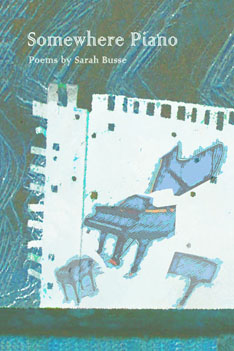 |
Comment on this
article

Somewhere Piano
by Sarah Busse
47 poems/56pages/$14.95
Mayapple Press
www.mayapplepress.com
Reviewed by: Ed Bennett
Denis Diderot wrote ”Poetry must have something in it that is barbaric, vast and wild”. Susan Busse’s collection of poems, Somewhere Piano, fits this description, surprisingly enough. This book of poems is surprising because Diderot’s words, no doubt meant for the wilds of barely inhabited landscapes, has its setting in the upper Midwestern suburbs. Ms. Busse can look out a window toward a stand of maples and wax rhapsodic about the “stick love” of the tent caterpillars in the branches. There is a portion of wildness in these poems that are delivered in the tempered voice of one who observes and understands.
Although the scenery of these poems might be familiar, Ms. Busse’s description of her surroundings usually takes an unexpected turn. In “We’re About to Boil the Eggs When” a simple daily chore is interrupted by a scene outside the kitchen window: crows have found a nest of small rabbits and begin to feed on them. While keeping this scene from the children in the kitchen, the poet’s mind wanders to the final lines:
“The angel of death has crow-dark wings.
Like us, crows like shiny things.
Like us, they give each other names,
They grieve, they joke, and they play games.”
A lesser poet would have forced the point of this shared barbarity and no doubt would have lost the reader. The commonality of humans eating a bird’s eggs and the crow’s feast is juxtaposed and simply left hanging before us to make our own sense of it. One does not read a poem of this kind as much as one shares it with the poet in an intimate intellectual bond.
In “Technologies of Windows” she compares the windows of her childhood, small paned and needing to be propped open, with the technical marvel of the modern office building. Again, her last lines make a simple statement for the reader to consider:
“And we’ve let sunshine in from floor to ceiling
with our improved technologies of glass.
The view is stunning. The windows cannot open.”
There is a Luddite with a laptop in this poet’s soul and she invites us to find it in ours.
The imagery in these poems, like the action of the poems, takes a hard turn away from the “usual”. The light of an autumn afternoon becomes:” the corn colored light of September”. A large ruddy man is described as “His face, all apples and beef…”. With so few words Ms. Busse creates a vivid setting with a skill closer to a Renaissance painter than a modern poet.
Within this book is also the sustained conceit first presented in the title, Somewhere Piano. The image of the piano appears in three poems in this book: “Desire”, “After a Piano Recital” and “Somewhere Piano, Again”. Each of these poems references the sound of a piano playing against a backdrop of loneliness. The piano echoes in the narrator’s mind during those solitary introspections one has during a walk in the rain or on an empty mental stage. The solitary feeling is given a poetic depth with the synesthesia of the audible yet unseen piano and the narrator’s isolation. While the poems in Somewhere Piano are impressive in themselves, this thread of piano and emotion that one finds here is perhaps the most impressive creation in these pages. Sarah Busse’s book is not just a themed collection, it is a single unified structure crafted from the sterling poems of a master poet.
Readers usually appreciate a good book of poems because of the skill of the poet or the beauty of the individual poems. While both elements are found in Somewhere Piano, Ms. Busse has added the additional dimension of introspection. This is an outstanding work and I recommend it highly. I am sure to be reading and re-reading it until her next book. Hopefully soon.
******
I began this review with a quote from Denis Diderot that I felt was appropriate to Sarah Busse’s poetry. I want to end it with a quote from Salman Rushdie: “A poet’s work is to name the un-nameable, to point at frauds, to take sides, start arguments, shape the world and stop it from going to sleep”. Sarah Busse and Wendy Vardaman are co-editors of Verse Wisconsin, a poetry magazine showcasing poetry of the Wisconsin community. In recent years they have been in the forefront of the cultural affairs of Wisconsin and, as Mr. Rushdie says, they do their best to shape the world.
Recent budget cuts in Wisconsin have led to the defunding of the State Poet Laureate position, demands for fewer library hours and benefit give backs from teachers, librarians and other unionized workers involved in cultural and educational fields. Sarah and Wendy have allowed their magazine to be a voice for these disenfranchised workers and have worked tirelessly to bring more than a tea party sensibility to the Wisconsin State Government.
I invite each of you to visit the Verse Wisconsin web site. There is plenty of fine literature, music and the rumble of populist thought from Wisconsin and other states. Poetry does not make a difference just sitting on a page. Sarah and Wendy transform poetry into action with this wonderful journal, shaping a better world and refusing us the slumber of indifference.
Return to:
©
2001- 2013, Quill & Parchment
Productions
All
contributions are copyright of the respective authors |


